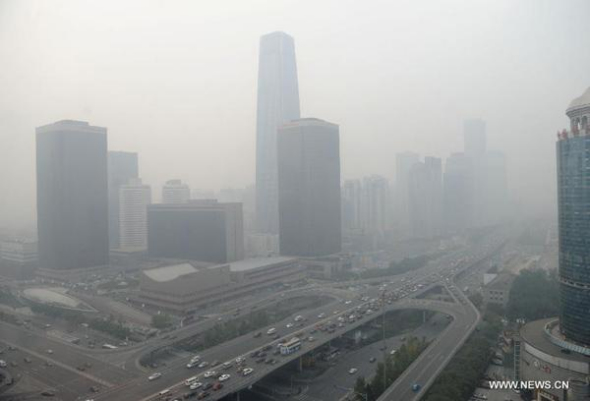


Buildings are blanketed in heavy smog near Guomao Bridge in Beijing, capital of China, Oct 28, 2013. (Xinhua/Luo Xiaoguang)
(ECNS)-- The China Youth Daily has refuted a blog post claiming that smog in Beijing is connected to nuclear radiation.
Citing several experts, the paper says the theory "lacks scientific evidence."
An article named "Collapse of China's Coal Industry and Radioactive Smog" posted by Mark Anthony last November was reposted by netizens across many social media platforms.
The author said the smog in northeast China is related to nuclear radiation. A large quantity of uranium dust from Inner Mongolia's coal mines float in the air, which has resulted in the lingering smog, he added.
However, in an email to China Youth Daily, he said it was all "theoretical inference." He said "the idea suddenly came to him" as he was reading a report about a world class uranium deposit found in 2012.
He added that he had no direct data to prove his theory.
Anthony claims to have a doctorate in physics and to have entered the University of San Diego in 1986, but the Graduate Records Office at the university responded in an email that there was no enrollment record of a student with that name.
Anthony's theory has also been refuted by many experts. Zhang Qinghong, deputy professor of Atmospheric and Oceanic Sciences at Peking University, said Beijing was plagued with smog around 2005.
Yao Qiang, head of the Department of Thermal Engineering at Tsinghua University, said the amount of uranium in coal is too small to have an impact.
As for the Daying area in Inner Mongolia, where coal and uranium are abundant, Wang Xiaoming, a professor of Geosciences at China University, said it is forbidden to explore a coal mine near a uranium deposit.
In the worst case, if coal with uranium is burnt, there is a low possibility that uranium will enter the air, said Guo Qiuju, from the Particle Physics and Nuclear Physics Department at Peking University.
That was backed up by Huang Dawei, deputy professor at the Mineral Survey and Investigation Department of Northeast University.
Guo Qiuju has monitored the amount of radon, the only gas product of uranium, in Beijing's air since 2003, and said he found no relation between radon and smog.
The amount of nuclear radiation in Beijing's air since August 2012 is at the normal level, according to the official website of the National Nuclear Safety Administration.
Young artist brings breath of fresh air to smog-choked Shanghai
2014-01-09Delta authorities pledge to battle smog together
2014-01-09Up to 500,000 die annually from China smog: report
2014-01-08One-year-old suffers from tumor caused by smog
2014-01-06Car emission an important contributor to smog
2014-01-03Official refutes CAS about source of Beijing smog
2014-01-03Copyright ©1999-2018
Chinanews.com. All rights reserved.
Reproduction in whole or in part without permission is prohibited.